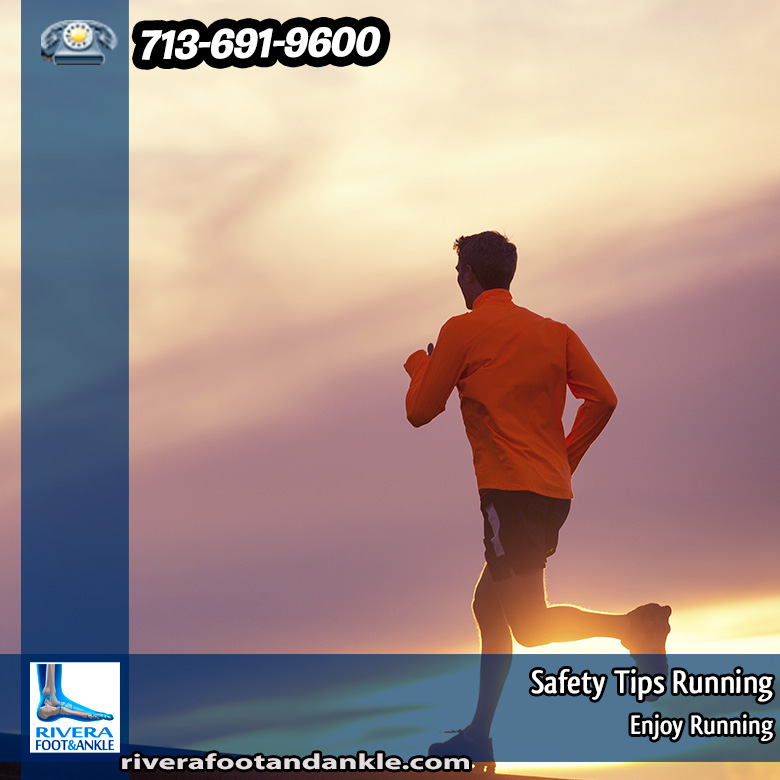
Safety Tips Running
Enjoy Running
Whether it's as part of a high school track program or cross-country team or just a way of getting in shape, running is a wonderful sport. It's great exercise, virtually anyone can do it, and all you really need to get started is a good pair of sneakers.
But running is not without its risks. Injuries - from sprained ankles and blisters to stress fractures and tendonitis - are common. And runners need to be aware of some hazards (from vehicles to wild animals) when choosing a place to run.
To keep things safe while running, follow these tips:
Avoiding Running Injuries
Up to half of all runners are injured every year, so the odds are good that at some point in your running career you will get injured.
Running, especially on asphalt or other hard surfaces, puts a lot of stress on the legs and back. This can lead to lots of different problems. The most common running injuries include sprained ankles, blisters, tendonitis, chondromalacia (runner's knee), iliotibial band (ITB) syndrome, heel pain, and shinsplints. Teen runners are also at risk of growth plate injuries.
Two steps can help you avoid serious injuries from running:
Try to prevent injuries from happening in the first place. Use the right gear, warm up your muscles before you start, and take precautions to deal with weather conditions - like staying well hydrated in hot weather and keeping muscles warm in the cold.
Stop running as soon as you notice signs of trouble. Ignoring the warning signs of an injury will only lead to bigger problems down the road.
Gear Guidelines
Running might require less gear than other sports, but it is still vitally important to get the right equipment to minimize the stresses it puts on your body. Anyone who has ever run in the wrong shoes can tell you what a painful experience it can be, and anyone who has run in the wrong socks probably has blisters to prove it.
Here are a few tips to make sure you get the right footwear before you start running:
Shoes
Before you buy a pair of running sneakers, know what sort of foot you have. Are your feet wide or narrow? Do you have flat feet? High arches? Different feet need different sneakers to provide maximum support and comfort. If you don't know what sort of foot you have or what kind of sneaker will work best for you, consult a trained professional at a running specialty store.
Minimalist shoes are becoming popular, but there's no evidence that they reduce injuries. Look for running shoes that provide good support, starting with a thick, shock-absorbing sole. Runners with flat feet should choose shoes that advertise "motion control" or "stability." Runners with high-arched feet should look for shoes that describe themselves as "flexible" or "cushioned."
Wearing shoes that fit correctly is more important in running than in virtually any other sport. As you rack up the miles, any hot spots or discomfort will become magnified and lead to blisters, toenail problems, and may contribute to leg problems.
If you plan on running on trails or in bad weather, you'll need trail-running shoes with extra traction, stability, and durability. Whichever type of shoes you end up purchasing, make sure they are laced up snugly so they're comfortable but not so tight that they cause discomfort.
Socks
Running socks come in a variety of materials, thicknesses, and sizes. The most important factor is material. Stay away from socks made from 100% cotton. When cotton gets wet, it stays wet, leading to blisters in the summer and cold feet in the winter. Instead, choose socks made from wool or synthetic materials such as polyester and acrylic.
Some runners like thicker socks for extra cushioning while others prefer thin socks, particularly in warm weather. Make sure you wear the socks you plan to wear when running while you try on sneakers to ensure a proper fit.
Source: kidshealth
RIVERA FOOT & ANKLE: At Orlando H.Rivera DPM, our priority is to deliver quality care to informed patients in a comfortable and convenient setting. When you have problems with your feet, you need to turn to a podiatrist who listens and responds… an experienced doctor who knows the field and can effectively diagnose and treat your needs… a friendly physician who counsels you on the best ways to maintain and improve your health. Our physician(s) meet all these criteria. Plus, you benefit from a dedicated team of trained professionals who give you the individualized attention you deserve.

Advanced Foot & Ankle Specialist.
Keywords: Foot and Ankle, Dr. Orlando Rivera, Advanced Foot & Ankle Specialist, Foot and Ankle Podiatry, Houston Foot & Ankle Surgical, Treatment of Foot and Ankle, Foot & ankle specialists, Podiatrist in houston, podiatrist in houston, Orlando H.Rivera DPM, Houston Foot Doctor, Foot and Ankle Surgeon Houston, Ankle and Foot Specialist Houston, Podiatrist Houston, Foot Pain Houston



